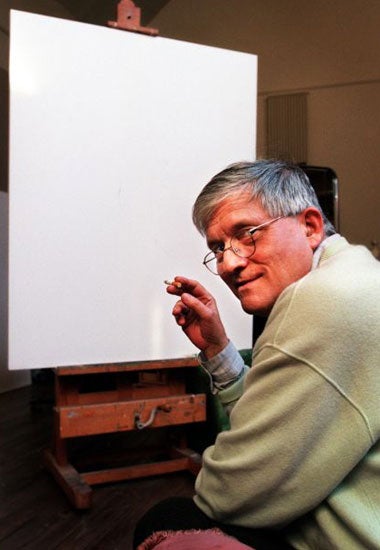Hockney's angry old men
Planned royalty on sales will smother market in 'red tape', says painter

Now David Hockney has trained his attentions on a new target: attacking a planned royalty fee which he believes will hamper sales of UK artworks. He says the fee, which would be paid to an artist by the vendor each time their work is sold on to another collector, will smother art sales in "red tape" and will put dealers off acquiring the work of up-and-coming artists.
The royalty, known as droit de suite, is already paid in many other European countries. The proposal goes before the House of Lords on Tuesday and its supporters say artists and their families should be able to benefit from rising prices of works because often creators of the pieces were not highly paid.
Joanna Cave, chief executive of the Design and Artists Copyright Society (DACS), supports the move and believes the law would "genuinely benefit artists".
She said: "By opting for legislation that creates an opportunity for the widest range of artists to earn royalties from their artwork, including those that need the money the most, the Government has done the right thing for British artists."
Hockney, 68, is one of six artists who yesterday signed a letter criticising the new levy which would cost sellers 4 per cent of the sale price. Other signatories included the painter Sir Howard Hodgkin and the artist Michael Craig-Martin, who as a former tutor at Goldsmiths College taught many of the generation of Young British Artists.
They said: "The arrival of this levy will do little or nothing for the vast majority of British artists. It will undoubtedly envelop the market, on which we as artists depend, in red tape and it will discourage art dealers from buying particularly the work of emerging artists. The Government's recent decision to go beyond the requirements of the directive will only make matters worse."
Hockney and those like him who can command vast sums for their paintings would benefit greatly financially. One of the Swimming Pool paintings, for which he is perhaps best known, recently sold for £1.8m, which would yield a £72,000 payment for him. Damien Hirst's Shark which sold for something in the region of £7m, would bring in about £280,000, while Tracey Emin's bed, bought for about £150,000, would have given her a more modest £6,000.
The royalty would apply to artworks which are sold for more than €1,000 (£670). DACS, which will collect the royalties on behalf of the artists, says a recent survey highlighted the cliché of the starving artist. More than a third of artists in a recent survey by the society were found to be earning less than £5,000 a year.
Those opposed to the move fear that the added financial burden means London would be placed at an unfair advantage. The city accounts for more than 50 per cent of the European art market, with annual sales at around £4.2bn.
Hockney who has been a giant in the British art world for more than 40 years, last year weighed in over moves to ban smoking in all public places. "Smoking calms me down," he said. "I don't want politicians deciding what is important in my life."
The art royalty - which is to be introduced to harmonise the art market across Europe - would be paid by vendors of works of art to living artists, and for 70 years after the artist's death to their heirs.
Join our commenting forum
Join thought-provoking conversations, follow other Independent readers and see their replies
Comments
Bookmark popover
Removed from bookmarks